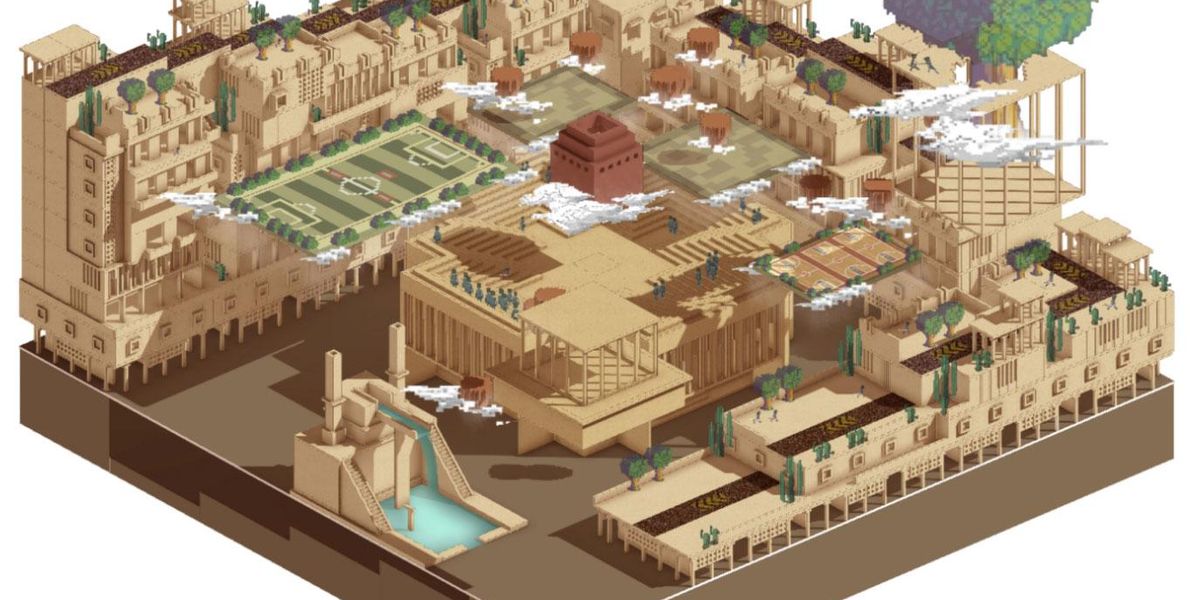

[ad_1]


The real estate boom isn’t limited to reality. A prime plot in Decentraland, a metaverse platform, sold for the equivalent of 2.4 million dollars in November of 2021, and less desirable land often sells for six figures.
This creates a problem all too common in the real world. Many who’d like to own a plot in the metaverse are now priced out. So Metaverse decentralized autonomous organizations (a.k.a. DAOs, sometimes jokingly referred to as “group chats with a bank account”) are forming to solve this. In the process, the DAO creates a new model for virtual property ownership.
But is the demand truly sustainable?
DAOs purchase, sell, and hold blockchain assets without control from a central authority. Buying the DAO’s token grants rights to influence decisions, often in proportion with ownership, though the specifics vary between groups.
“It’s largely a combination of a long-term, rather speculative investment, and the current utility that digital land provides, with the former currently dwarfing the latter.”
—Mihai Vicol, Newzoo
The purpose of a metaverse DAO might seem straightforward: Buying gives you a stake in the metaverse even if you can’t afford a plot—right? Well, that depends.
PangeaDAO is among the more traditional groups. A recent post on the DAO’s Mirror page claims “virtual land will one day be a yield-bearing, high-appreciation asset” that consistently generates revenue. PangeaDAO wants to buy virtual real estate, develop it, lease it, or sell it as an asset, much as real estate investment trusts do with real-world properties. The DAO is still in a very preliminary (what’s called a “pre-whitelist”) phase, though, and so it does not yet own actual properties in the metaverse.
EnterDAO is already renting metaverse property in Decentraland, which puts it ahead of the curve. Yet that’s not its only goal. Its land rental marketplace, Landworks, is just one of two major initiatives. The other is MetaPortal, a desktop app meant to serve as a portal into multiple metaverse games. Both projects are related to the metaverse, but that’s where the similarities end.
Another spin on the concept can be found at MetaOasis DAO (not to be confused with MetaOasis, a separate metaverse project). Though pitched as a “new paradigm in real estate development,” activity on the DAO’s Discord channel, and a recent council meeting, seems focused on development of City Oasis, a specific plot the DAO owns in The Sandbox metaverse. The DAO has also moved to issue NFT avatars called Zzoopers, each with its own backstory. The result looks like an investment group and a video game developer thrown in a blender.
Metaverse DAOs are pitched on the promise of making metaverse ownership more accessible, but it’s still early days. PangeaDAO, as mentioned, is still organizing. MetaOasis DAO owns 35 plots in The Sandbox but has yet to develop most. EnterDAO has rented a few dozen plots in Decentraland since February of 2022, though mostly at rates below 10 dollars a day.
MetaOasis DAO has also moved to issue NFT avatars called Zzoopers, each with its own backstory. The result looks like an investment group and a video game developer thrown in a blender.
So what, then, is the ultimate point of virtual land?
The differences between each metaverse DAO highlights the messiness of the metaverse in 2022. Interest is high, but the point of owning a chunk of the metaverse differs significantly from one buyer to the next.
“It’s largely a combination of a long-term, rather speculative investment, and the current utility that digital land provides, with the former currently dwarfing the latter,” Mihai Vicol, Junior Market Analyst at Newzoo, said in an email.
For speculators, that goal is obvious: profit. For everyone else, virtual real estate is a bet on the metaverse, an attempt to boost a brand, or an opportunity to generate revenue on virtual goods, or possibly all that, and more. A high-traffic spot is a bit like a flagship property in downtown San Francisco or Hong Kong. British multinational bank HSBC, for example, owns land in The Sandbox and aspires to entertain users with educational games.
HSBC Stadium shows how brands hope to boost their visibility in the metaverse.HSBC
“It is brands that stand to gain the most by establishing a 3D, digital presence in the metaverse,” says Vicol. “Owning digital land… allows brands to advertise themselves to younger generations and to interact with them in a way that users of these virtual worlds perceive as more natural.”
Vicol points out that Roblox, an online game platform that lets players create their own games and experiences, has over 200 million monthly active users. Today’s metaverse platforms are tiny by comparison, but virtual real estate in a successful metaverse could be valuable for any company or person looking to connect with a younger audience.
For now, however, everyone crowding into metaverse real estate—be it through a DAO or direct investment—is buying and building with hope an audience will eventually arrive. Whether that will prove true is anyone’s guess.
[ad_2]Hey there! Ready to embark on a historical journey with Air India? Whether you're a…
In 2017, altcoins were seen as experimental side projects to Bitcoin. By 2021, they became…
Shopping centers in Las Vegas have a unique opportunity to stand out by offering not…
Levitra, a widely recognized medication for treating erectile dysfunction (ED), has proven to be a…
Have you ever looked down at your carpet and wondered if there’s a budget-friendly way…
Counter-Strike 2 (CS2) has elevated the thrill of case openings, captivating both seasoned CS:GO veterans…